
The Roman feast
George Guidoni
Automation Food Safety Corrugated Robotics Automation CFIA (Canadian Food Inspection Agency) Cryovac food safety GFSI (Global Food Safety Initiative) HACCP (Hazard Analysis Critical Control Points) IGA Maxi Metro Provigo RapidAirSystem Reiser Robotics Roma Food Products Ltd. Sealed Air Corporation Variovac Optimus VARIOVAC PS SystemPack GmbHVenerable Montreal sausage processor brings in advanced thermoform packaging capabilities to give its authentic deli creations a modern competitive edge
Everyone knows that Rome was not built in a day. But most people will agree that when it finally did get built, the enormous time and effort to get it done was ultimately well worth it.
As one of the world’s most stunningly gorgeous cities, the capital of modern-day Italy continues to endure as one of Western Civilization’s greatest cultural, spiritual and intellectual centers still extending profoundly deep influence on many areas of modern-day society—with its world-class cuisine one of the many hallmarks of its eternal glory and fame.
And thanks to the wonders of modern food processing and packaging technologies, it is no longer necessary to travel to Rome to taste the city’s many culinary gifts to the world, with countless ranks of Italian food producers all over the world proudly carrying the torch of the city’s proud gastronomic legacy.
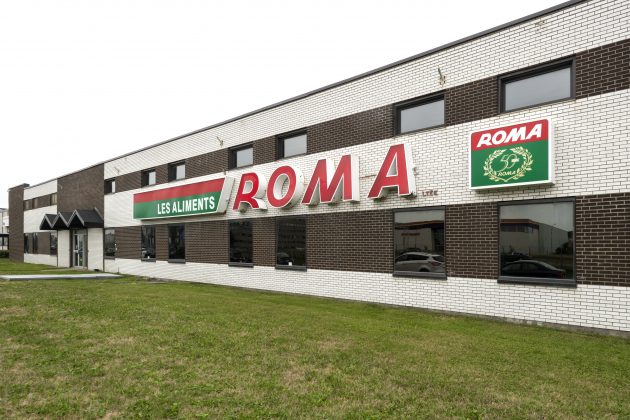
Opened up in 1965, Roma Food’s production facility in the Montreal suburb of Saint-Laurent employs about 130 people on a busy two-shift, six-days-a-week production schedule to turnmout an expansive product portfolio comprising overs 130 different stock-keeping units (SKUs).
Founded back in 1953, Montreal-based Les Aliments Roma Ltée (Roma Food Products Ltd.) is a proud champion of the famed Italian tradition of producing mouth-watering Italian deli meats such as pepperoni, salami, mortadella, capicolli and other premium-quality Italian charcuteries made with the care, love and patience that have made these products such highly-prized delicacies to begin with decades and centuries ago.
Starting out as a pepperoni salesman in Montreal, company founder Pasquale Ramacieri Sr. has a good fortune to meet a local Italian-born charcuterie expert who was willing to share his vast knowledge of the Italian sausage production methods and help Ramacieri bring to life his long-held vision of bringing traditional charcuteries to Canada.
Capitalizing on strong local demand for cooked pepperoni, the hard-working duo proceeded to diversify the fledgling company’s product portfolio to other famed deli meats such as mortadella and capicolli—soon offering the Quebec market a growing selection of locally manufactured Italian deli boasting the same tantalizing taste profiles and quality as the deli meats produced back home in Italy.
With business taking flight, in 1965 the company established a fully equipped production facility in the north Montreal suburb of Saint-Laurent, where today the family-owned business produces approximately 130 different SKUs (stock-keep units) of high-quality Italian cold cuts for a growing range of customers in the retail and foodservice markets.
Employing about 130 full-time staff over a two-shift, six-days-a-week schedule that ramps up to nearly full capacity during the busy summer barbecue season, the 50,000-square-foot facility processes an average of 100,000 kilograms of meat at the two-storey building, certified to meet all the pertinent HACCP (Hazard Analysis Critical Control Points) compliance requirements as mandated by the CFIA (Canadian Food Inspection Agency) and the plant’s internationally recognized GFSI (Global Food Safety Initiative) standards certification for food safety.
“Some of our retail and private-label customers require GSFI certification today as part of doing business with them,” explains current company owner and president Pascal Ramacieri, noting that about 60 per cent of the factory’s output is shipped to into the retail sector, with the remaining 40 per cent allocated for the foodservice business.
“It is an extremely competitive business, with many acquisitions taking place in the past few years,” Ramacieri says, “so the small- to medium-sized processor like us definitely have to be able to ensure our customers of the highest safety and quality of our product, while also being more innovative in the types of products we offer.”
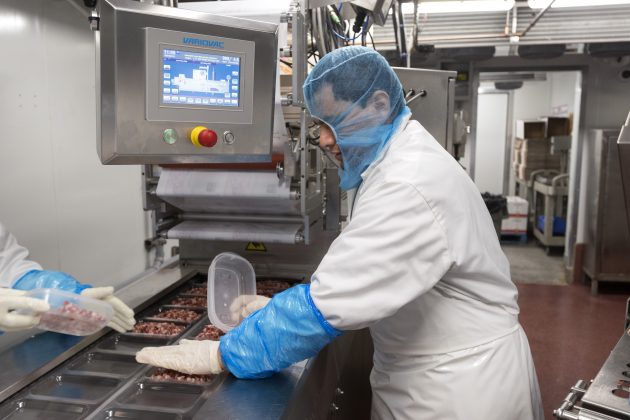
A Roma Food plant employee pre-loading the bottom thermoformed semi-rigid plastic trays with pre-measured portions of diced Pancetta before running them through the Variovac Optimus machine to perform all the required gas-flushing and to apply and seal the top film layer with a super secure seal all around the package.
Ramacieri adds that it is also important for Roma to play up its Quebec roots, with much of its retail product carried throughout the province by established grocery chains such as Maxi, Provigo, Metro and IGA—pointing out that over 70 per cent of the incoming raw meet shipped into the plant for processing comes from Quebec.
“Our products are made from ingredients of Quebec origin and, in addition, all the processing and packaging activities are carried out in Quebec as well,” Ramacieri says.
“This authorizes us to affix the ‘Aliments du Québec’ logo onto our products, which is what many Quebec consumers look for on their product labels.”
Insofar as product innovation, Ramacieri says the company has he a lot of rennet success with the development of so-called ‘cleaner’ product like gluten-free pepperoni, along with MSG-free a nitrate-free cold cuts, experimenting with celery power to replace sodium nitrate.
Such innovation has enabled Roma to expand intosome new retail market in Ontario and elsewhere in Canada through the Loblaws and Walmart chains, Ramacieri relates, which is a considerable point of pride for the company.
“Little by little we are making Montreal Style pizza known outside of Quebec,” says Ramacieri, citing the company’s immensely diverse variety of pepperoni comprising over 40 different flavor variations.
“In Quebec, we put pepperoni before cheese, elsewhere in Canada we put pepperoni on cheese,” Ramacieri proclaims, citing the company’s flagship Roma Pepperoni brand as a runaways market leader for pizza pepperoni in Quebec.
As Ramacieri explains, “We market ourselves, and our brand, as a family-owned quality conscious company willing to adapting to fill consumer demands for news varieties of products, while employing skill labor optimal consistency in our processing and quality, while maintaining the integrity of our product recipes.”
This means strict adherence to the traditional time-tested authentic methods of seasoning, fermenting, cooking, curing, air-drying and curing of the meat to produce superior-quality charcuteries and sausages.
With some charcuteries requiring cooking and/or refrigerating and others simply dry-cured in special at temperature-controlled rooms, patience is a big virtue in terms of achieving high product quality.
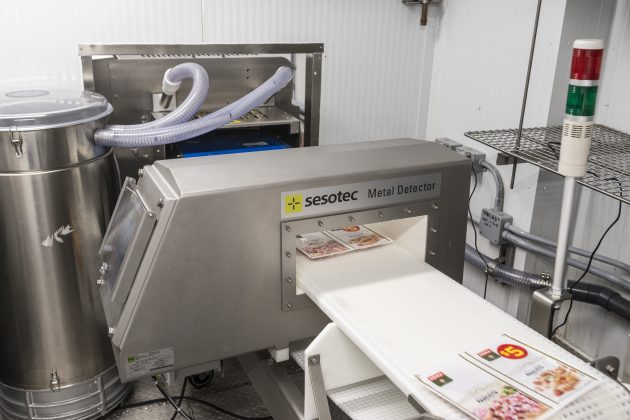
All the finished retail packages coming off the Variovac Optimus thermoformer are passed through a high-sensitivity Sesotec metal detector to check for any possible contaminants that may have inadvertently made their way into the package before being transferred down the line for secondary packaging.
Some of the popular dry-cured products like salami, sopressata, pancetta and salmetti, might be literally hung up to dry for 21 to 140 days, depending on size and product attributes such as desired dryness, texture and taste.
For pre-cooked charcuteries such as mortadella and capicolli, the products are put in walk-in ovens to be slowly cooked until they reach a minimum internal temperature of 160°F (71°C).
Although the processes are different, all the fresh and cooked sausages processed at the plant are subjected to a similar level of close scrutiny and attention to detail, including the use of natural pork casings that are soaked overnight ensure optimal flavour for the sausage meat inside.
On the processing side of the operation, the Roma plant currently houses four sausage production (stuffing) lines and one grinding/mixing line to fabricate its sausage meat and products, while the packaging side comprises two vacuum-packing pouch lines, two rollstock film lines, one vertical form-fill-seal (VFFS) line, two tray-sealing lines, and one bulk-product box line.
Whatever packaging method or line is used to pack a particular products, the key is to always package each products at its optimal freshness point to capture all the captivating aromas inside the package, according to Ramacieri.
“Due to extreme space restriction at our facility, our lines are not as fully automated as they can be,” Ramacieri concedes, but that may change in the future as the company continues to grow.
That said, to boost its packaging capabilities, the plant recently installed a brand new Variovac Optimus rollstock machine supplied by Reiser (Canada) Ltd., Burlington, Ont.-based Canadian subsidiary of leading packaging machinery manufacturer Reiser of Canton, Ma.
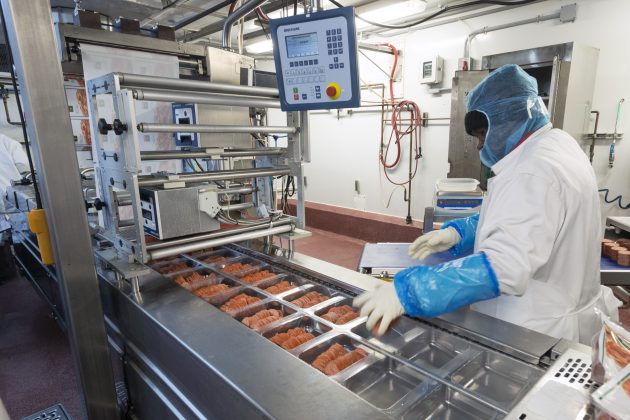
The Roma Food production facility also employs a made-in-Germany Multivac thermoforming machine, now in its 15th year of service at the plant, to make retail packages of the company’s famed sliced pepperoni, which is available in some 40 different variations, including the recently-introduced gluten-free variety.
Used primarily for packaging of sliced products, along with a few select cured items, the high-performance machine can produce both vacuum-pack and MAP (modified atmosphere packaging) packages intended to provide with the highest possible shelf-life performance for the packaged product.
“We take product shelf-life very seriously here,” says Ramacieri, citing shelf-life of 18 days for packages of Italian sausage; 45 to 60 days for authentic cooked charcuteries and pepperoni; and up to 180 days for the traditional dry-cured charcuteries.
Installed last March, the Variovac Optimus machine runs at a rate of eight cycles per minute, primarily using high-barrier plastic film supplied by the Cryovac division of Sealed Air Corporation.
“We are very satisfied with our acquisition,” says Ramacieri, “and we are also satisfied with Raiser’s service capabilities, which came in handy in the early part of installation due to some compatibility issues with a Bellmark printer supplied with the machine.
“The Reiser technicians handled the situation as best as it can be handled,” says Ramacieri. “We’re very happy to be able to rely on Raiser’s technical staff at all times, which is a significant advantage.”
Due to the aforementioned space constraints at the plant, “We were looking for a compact machine that would occupy a fairly small amount of space,” Ramacieri relates.
“So our choice of the Variovac Optimus model, which is only three meters long, was very much in line with this requirement.”
As for the quality of packaging produced by the machine, Ramacieri says he is very fond of the “high-level sealing” produced by the machine, along with the “high-quality product presentation, which is a very important factor for products competing in the supermarkets’ refrigerated products displays.”
Manufactured in Germany by Reiser’s long-time business partner VARIOVAC PS SystemPack GmbH, the Optimus machine was designed as a compact thermoformer engineer to deliver consistent precision forming in both semirigid and flexible film packaging application with innovative RapidAirSystem technology that eliminates the need for pre-heating the film—thereby achieving vastly reduced footprint requirements.
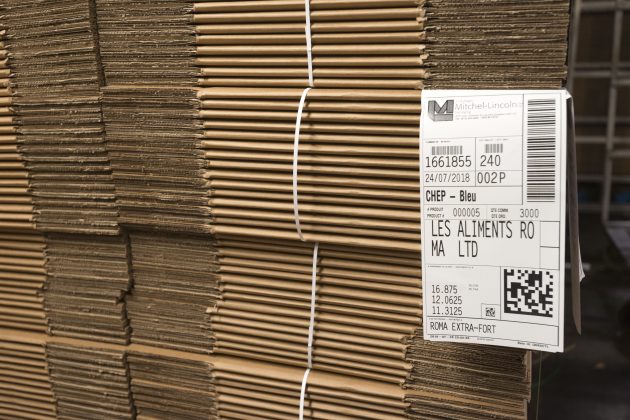
The Roma Food plant makes extensive use of corrugated boxes made by Cascades Canada to distribute its retail products outside of Quebec.
Controlled via an operator-friendly touchscreen interface, the highly flexible machine stainless-steel machine can handle up two five different film widths and two film roll core diameters to produce packages of up to 110-mm in depth t speed of up to 13 cycles per minute, while offering many different options to facilitate seamless integration with metal detectors, labelers, filling machines and other systems to provide a turnkey packaging solution.
With capacity to store up to 40 individualized machine recipes, the Optimus machine is designed to facilitate quick format changeovers, according to the company, and it uses just one set of package guide bars to enable production of every packaging format it produces, including skin, steam and shrink packaging.
Critically, the washdown-ready system was designed in accordance to the highest hygienic and sanitary standards in the food industry, according to the manufacturer, which makes Ramacieri feel good about this fairly significant capital investment by the Roma manufacturing plant.
“Packaging will always play a major role in our industry,” Ramacieri reflects.
“Reducing the amount of packaging is one of our company’s strategic goals, and it should also be the goal of both the consumers and the packing industry at large.
“By using packaging that extends product shelf-life and reduces food waste,” Ramacieri concludes, “I feel like we are doing our part.”
Advertisement

